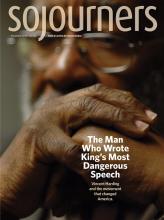IN NOVEMBER 1964, as the long Cold War heated up again, this time in Vietnam, Trappist monk Thomas Merton set forth a koan to 14 peacemakers: “By what right do Christians protest?” For three days, these activists and theologians—famously uniting Catholic and Protestant faith traditions—met with Merton in the Kentucky hills, grappling with how and why Christians should resist the violence of war.
Historian Gordon Oyer has re-created this meeting so pivotal to the peace movement and—most important—assessed its meaning for our time. The historic retreat is meticulously sourced with detailed textual analysis of the presenters at the retreat and the writers who influenced them. Particularly impressive is the lucid summary of the era and the delicacy and respect with which the author treats cultural and doctrinal differences among the participants.
Ecumenism in peace work is thankfully common today, but in the early ’60s the blending of faith traditions at the retreat was groundbreaking. Even more revolutionary were the two Masses the group celebrated together, with Jesuit priest Dan Berrigan presiding, everyone in the group receiving communion, and John Howard Yoder, a Mennonite theologian, preaching at the second liturgy. (Both practices were proscribed at the time.)
Attendees included Phil Berrigan, later one of the creators of the Plowshares actions for nuclear disarmament, and A.J. Muste, dean of the U.S. peace movement at the time, with years of experience in War Resisters League, the Committee for Nonviolent Action, and the Fellowship of Reconciliation (FOR). FOR’s Paul Peachey and John Heidbrink were instrumental in initiating and organizing the retreat, although neither of them could attend in the end. (Neither could two other invitees—Bayard Rustin and Martin Luther King Jr.)
Read the Full Article

